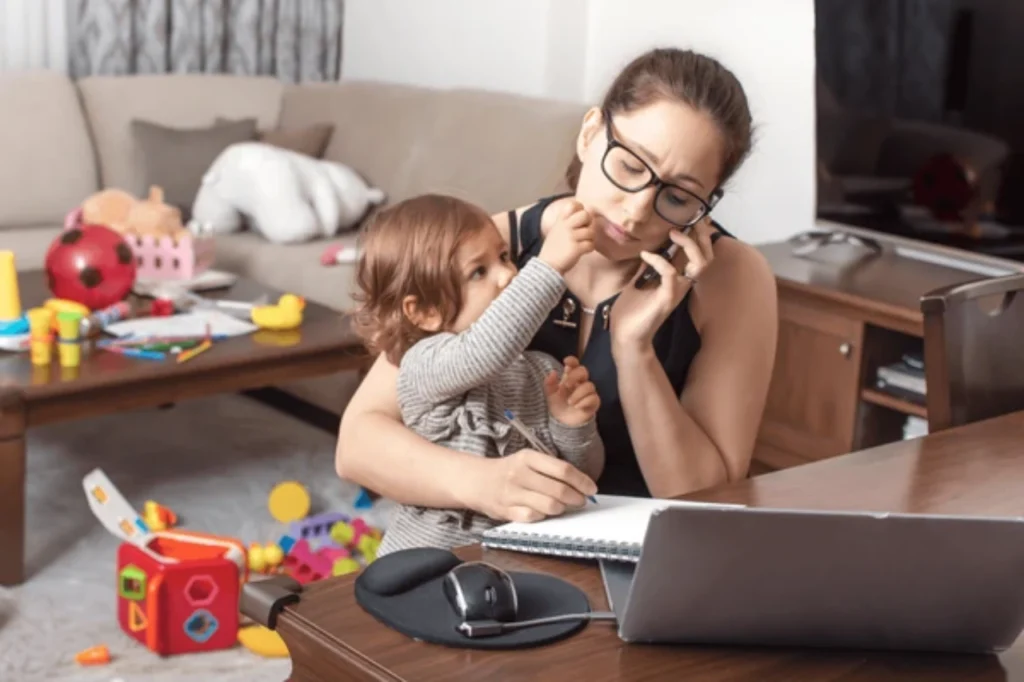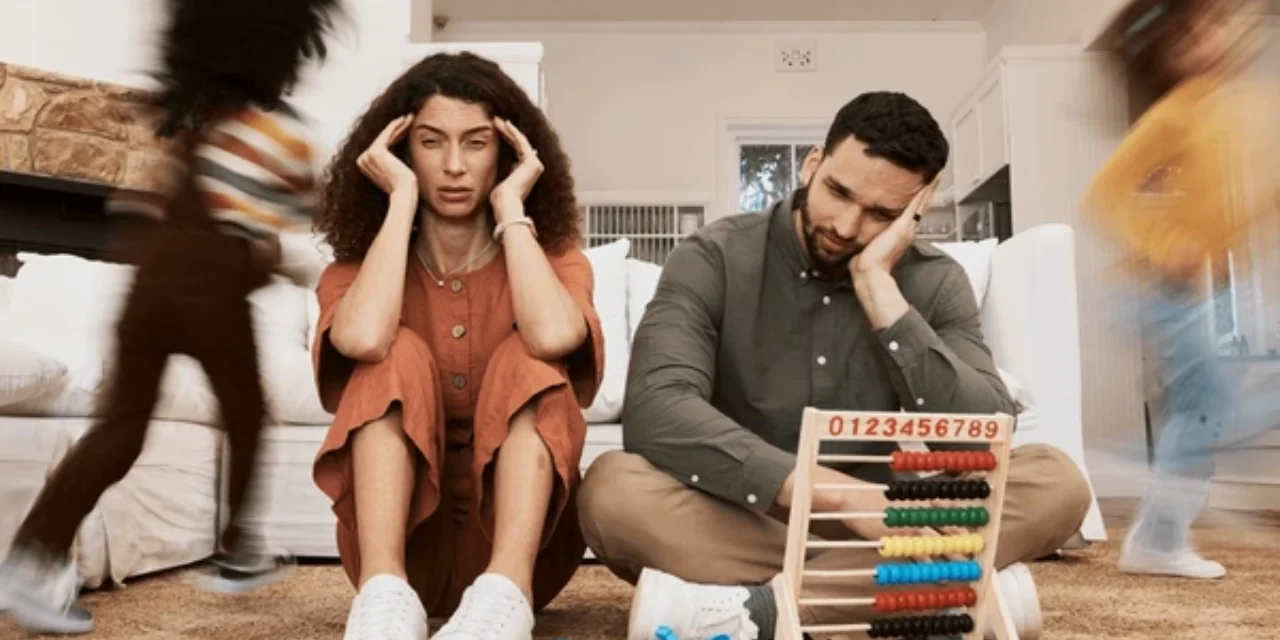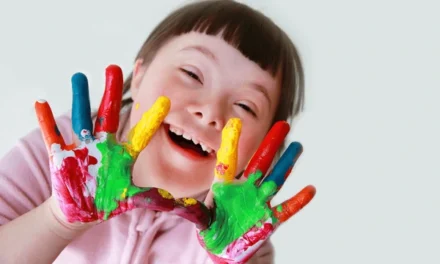As a parent, you’ve given your all to raise your kids well. But what if parenting becomes too much? Since 2019, the World Health Organization has recognized parental burnout as a growing problem worldwide1.
Burnout makes you feel emotionally drained, disconnected, and less fulfilled1. It’s not just for doctors or lawyers; even parents can feel overwhelmed, especially after the pandemic1. If you feel like you’re just going through the motions, you’re not alone.
Parental burnout comes from too much stress and not enough support1. Things like cultural norms, family size, and special needs can increase your risk2. It can lead to emotional distance, harsh parenting, and even thoughts of suicide1.
But there’s hope. Knowing the signs and taking steps to prevent burnout can help you find joy again. This guide will help you understand burnout, its signs, and how to manage it. Let’s work together to make you the parent you’ve always wanted to be, without losing yourself.
Key Takeaways
- Parental burnout is a recognized occupational condition characterized by emotional exhaustion, depersonalization, and a decrease in self-fulfillment.
- Burnout rates vary significantly by country and culture, with factors like the number of children, presence of special needs, and work-life balance contributing to the risk.
- Consequences of parental burnout can include emotional distancing, coercive parenting, and even suicidal ideation.
- Understanding the signs of burnout and taking proactive steps to address it is crucial for maintaining your well-being and strengthening your family relationships.
- Developing sustainable self-care practices and seeking support from your community can help you prevent and manage parental burnout.
Understanding Parental Burnout: A Modern Epidemic
Parental burnout is more than just stress from raising kids. It’s feeling extremely tired and disconnected from being a parent. Fifty-seven percent (57%) of parents feel this way, showing it’s a big problem today3.
What Makes Parental Burnout Different from Regular Stress
Parental burnout is unique because it’s tied to the demands of parenting. It’s not just the usual ups and downs. It’s a constant feeling of being drained and overwhelmed by parenting duties.
The Science Behind Parental Exhaustion
The science shows many factors contribute to parental burnout. Studies say it can lead to depression and anxiety in parents. This can harm their kids’ behavior and emotions4.
Using positive parenting methods can help prevent burnout. These include showing love, warmth, and setting clear rules3.
Impact on Mental and Physical Health
Parents’ mental health affects their kids’ too. Burnout in parents can lead to harsh parenting and more mental health issues in children3. It can also cause physical problems like chronic fatigue and a weakened immune system.
It’s important to tackle parental burnout for the sake of parents and their kids. By understanding parenting challenges and taking care of themselves, parents can be stronger and create better family relationships345.
Key Signs You’re Experiencing Parental Burnout

Parental burnout is more than just feeling tired. It’s a deep exhaustion that affects your body and mind. If you’re feeling this way, you might feel emotionally drained and distant from your kids. You might also feel like you’re not doing a good job as a parent6.
This burnout can really change your life and your kids’ lives too6.
It’s not just about being tired after a long day. It’s a constant feeling of being drained6. You might feel stressed, anxious, or depressed6. You could also have headaches, muscle tension, trouble sleeping, and a weak immune system6.
Emotionally, you might feel numb or overwhelmed. You might even dream of getting away from your parenting duties7.
Burnout can make it hard to connect with your kids. You might not respond to their needs as well6. You might also forget to take care of yourself, which can make you feel even more resentful and tired6.
This can create a cycle of disconnection in your family. It can have serious effects7.
It’s important to recognize the signs of burnout, like feeling emotionally drained and neglecting self-care6. By getting help, sharing responsibilities, taking care of yourself, and being kind to yourself, you can find balance again in your parenting role678.
Remember, you’re not alone. Many parents go through burnout. With the right help and strategies, you can get through it and find your way back as a parent7.
The Physical and Emotional Symptoms of Burnout in Parents
Parental burnout shows up in many ways, both in body and mind. It’s key for parents to know these signs to get help9.
Physical Manifestations
Feeling tired all the time and not sleeping well are big signs of burnout10. This constant tiredness can mess with hormones, making it hard to feel like having sex9. Also, the stress of burnout can raise the risk of serious health problems like heart disease and diabetes9.
Emotional and Mental Effects
Emotionally, burnout can make parents feel distant, short-tempered, and unhappy in their parenting role10. This can hurt the bond between parents and kids, possibly causing problems in the child’s development9.
Behavioral Changes to Watch For
Burnout can also show up in how parents act. They might pull away from their kids, have trouble showing love, and argue more at home10. Parents might get short with their kids because they’re too busy or always saying “yes”10.
It’s important for parents to spot these signs early. Taking steps to manage stress and taking care of themselves can stop burnout from getting worse9
| Symptom | Description |
|---|---|
| Physical | Fatigue, headaches, increased susceptibility to illness, hormonal imbalances, and poor sleep quality. |
| Emotional | Feelings of detachment, irritability, and loss of enjoyment in parenting, as well as the impact on parent-child relationships. |
| Behavioral | Emotional distancing from children, difficulty showing affection, increased conflict with family members, and snappiness or impatience with children. |
By knowing the many symptoms of burnout, parents can start to fix the problem. This helps them find balance and feel better again91110.
Cultural Factors Contributing to Parental Burnout
Research shows that cultural norms greatly affect parental burnout rates12. In Western cultures, parents often feel more burnout because of the focus on winning, doing well, and being perfect12. These cultures also make it hard for parents to ask for help, which adds to their stress and makes it harder to cope12.
A study looked at parental burnout in 42 countries and found that Western cultures have much higher rates12. It shows that cultural values, especially individualism, are more important in causing burnout than money or family issues12.
| Country | Prevalence of Parental Burnout |
|---|---|
| Thailand, Cuba | Less than 1% |
| United States, Canada, Poland, France, Belgium | 5-8% |
Research has also looked into how individualism affects parental burnout13. It found three main reasons: feeling like you don’t meet up to societal expectations, wanting to teach children to be independent, and not sharing parenting duties13. Parents in these cultures often feel like they don’t live up to what society expects, leading to burnout13.
Carrying all the parenting duties alone, without help from family, is also a big risk for burnout in these cultures13. The focus on teaching children to be independent adds to the parenting load and links to burnout13.
It’s important to understand how cultural norms, parenting expectations, and societal pressure affect burnout14. By recognizing these factors, we can find better ways to support parents and stop burnout14.
The Impact of Modern Parenting Expectations

In today’s world, parents feel a lot of pressure to show off a perfect family life on social media. This “cult of the perfect parent” sets high standards that are hard to meet. It makes parents feel not good enough and tired15.
Studies in 42 countries show that about 5% of parents are burned out. In Western countries, this number goes up to 9%15. Burnout can lead to serious problems like wanting to harm oneself, using drugs, and being aggressive. It also hurts children’s mental health15.
Social Media Pressure
Social media makes parents feel like they must show a perfect family life16. Seeing others’ perfect lives can make parents feel like they’re not good enough16. The need to always post and share can make parents even more stressed and burned out16.
The Myth of Perfect Parenting
Today, parents feel like they must be perfect in raising their children17. This pressure can make parents burn out as they try to meet these high standards17. Experts say it’s better to focus on being positive and loving, rather than trying to be perfect17.
Parents can fight burnout by understanding the pressure of modern parenting and social media17. Using strategies like listening well, changing negative thoughts, and thinking about what’s important can help17.
How the Pandemic Intensified Parental Stress
The COVID-19 pandemic made parental burnout much worse. Parents had to take on many roles at once, without their usual help. Studies found that working parents, especially those who are primary caregivers, felt more stressed during lockdowns.18
In Norway, a study of 1,488 parents showed that younger age, bad coping strategies, insomnia, stress, and lower satisfaction all led to more parental burnout18. Also, unemployed parents and those with mental health issues felt more burnt out18.
In Portugal, a survey showed that 82% of people felt anxious, sad, or angry every day or almost every day in the first month of lockdown19. This emotional struggle was made worse because 90.1% of children aged 3-5 were in preschools before the pandemic, disrupting family life19.
Interestingly, mothers felt more burnt out throughout the pandemic, with fathers experiencing more growth in burnout19. This shows that mothers carry a bigger load, especially since 87% of single-parent families in Portugal are headed by mothers19.
The COVID-19 pandemic has clearly worsened the pandemic parenting crisis, causing more COVID-19 stress and upsetting the work-life balance for families. It’s important to understand the unique challenges parents face to find effective ways to help.
Risk Factors for Developing Parental Burnout
Parental burnout is a growing concern that affects families and individuals. It’s important to know what causes it to address it effectively. Identifying key risk factors is crucial20.
Individual Risk Factors
Some traits and behaviors can make parents more likely to burn out. Traits like perfectionism and high standards are more important than age or child age20. Also, certain early maladaptive schemas (EMSs) can lead to depression, anxiety, and burnout in parents20.
Environmental Contributors
Environmental factors also play a big role in parental burnout. Money worries, feeling isolated, and caring for children with special needs add to stress21. In Western countries, the pressure of modern parenting and social media can make it worse21.
Knowing the different risk factors helps parents and caregivers spot burnout signs early. They can then take steps to prevent and manage it2021.
| Risk Factor | Description |
|---|---|
| Dispositional Factors | Perfectionism, high personal standards, and specific early maladaptive schemas (EMSs) |
| Environmental Factors | Financial insecurity, social isolation, demands of caring for children with special needs or chronic illnesses, modern parenting expectations, and social media influence |
The Connection Between Work-Life Balance and Parental Stress
Managing work and parenting can really stress people out. Full-time working moms might feel less stressed than part-time moms because they know their roles better22. But, the COVID-19 pandemic has made it harder for parents to separate work from home life, making stress worse22.
Parents with kids under 18 often feel more stressed than others, according to the APA22. In 2023, a third of parents said they were very stressed, compared to just 20% of others22. A study found that about 5 million U.S. parents deal with burnout every year22.
Parents can get burned out, just like workers, because of too much stress22. This burnout comes from being too tired, feeling distant from others, and losing touch with what makes them happy22. People who are too hard on themselves or put too much pressure on themselves are more likely to burn out22.
Finding a good balance between work and life is key to feeling good and being happy23. But, the pressure to work hard and take care of family can make stress even higher23. People with different views and cultures handle work-life balance in different ways23.
To deal with stress and avoid burnout, parents should be kind to themselves. They can take short breaks, take care of themselves, and focus on the good parts of parenting22.
| Work-Life Balance Factors | Impact on Parental Stress |
|---|---|
| Marital/Cohabiting Status | Participants not in marital or cohabiting status reported significantly higher levels of work-life stress23. |
| Childcare Support | Participants with childcare support reported higher levels of work-life stress than those looking after their children themselves or with their partners23. |
| Elderly Care Responsibilities | A similar pattern was observed among participants involved in elderly care, with higher work-life stress levels23. |
| Gender Roles | Men are more likely to focus on work, potentially neglecting family responsibilities, while women are expected to shoulder domestic duties regardless of employment23. |
| Child Age | Women with younger children tend to experience more difficulties managing family responsibilities compared to those with older children23. |
| Cultural Beliefs | The competitive work environment and the cultural emphasis on family care in some regions can contribute to significant stress levels23. |
“Work-life balance has been linked to enhanced job satisfaction, reduced sickness absences, lower turnover intention, and improved job performance.”23
Understanding how work-life balance and parental stress are connected can help parents manage their well-being and avoid burnout2223.
Essential Self-Care Strategies for Burned-Out Parents
Being a parent can be overwhelming. But, letting burnout take over can harm your health and family care. It’s key to use self-care strategies to keep your emotional and physical health strong during tough times.
Daily Wellness Practices
First, focus on getting enough sleep. Aim for 7-9 hours each night. Good sleep helps your body and mind stay strong24. Also, make time for hobbies and interests outside of parenting, even just 30 minutes a day. This can help you feel refreshed and happy24.
Be kind to yourself too. Acknowledge your hard work and celebrate your small victories. This helps you stay positive and motivated24.
Setting Healthy Boundaries
Saying “no” can be hard, but it’s crucial to avoid burnout24. Share tasks with your partner, family, or friends. Don’t be afraid to ask for help when you need it24. Make sure to have some time for yourself each day, even if it’s just 15 minutes, to do something that makes you feel good.
By adding these self-care habits to your daily life, you can lower the chance of burnout. This helps you keep a healthy balance between your duties and your own well-being2425.
| Self-Care Strategy | Benefits |
|---|---|
| Prioritizing sleep | Improved physical and mental resilience |
| Engaging in hobbies | Increased sense of well-being and personal fulfillment |
| Practicing self-compassion | Reduced stress and guilt, enhanced self-esteem |
| Setting boundaries | Preservation of energy and prevention of burnout |
| Asking for help | Reduced isolation and increased support network |
| Carving out personal time | Improved mental and emotional well-being |
“Taking care of yourself is not selfish – it’s essential for being the best parent you can be.”
Remember, small, consistent self-care acts can make a big difference. They help lower your risk of burnout and improve your overall well-being2425.
Building a Support Network to Prevent Burnout
As a parent, you’re not alone. Creating a strong26 support system is key to avoiding26 burnout. It’s important to have family, friends, or professional help. They can offer emotional and practical support, making a big difference.
Studies show that parents in strong26 community support networks feel less26 burnout. Getting help early can stop burnout from turning into26 depression. Using community resources and support27 gives a much-needed break and26 sense of belonging.
- Find trusted friends and family for a listening ear, help, or just a shoulder to lean on.
- Look for local26 parenting support groups, online or in-person, to connect with others facing similar challenges.
- Seek26 professional help, like a therapist or parenting coach, for coping strategies and stress management.
You don’t have to face parenting alone. A strong26 support network is a powerful tool against burnout and keeps you well as a parent.
| Support System | Benefits |
|---|---|
| Family and Friends | Emotional support, practical help, sense of community |
| Parenting Support Groups | Connection with others facing similar challenges, shared strategies |
| Professional Help | Personalized advice, effective stress management techniques |
“The greatest weapon against stress is our ability to choose one thought over another.” – William James
By proactively building a26 support network, you can handle parenting’s ups and downs better. You’ll find the26 resources you need and avoid burnout’s harm.
Practical Steps to Recover from Parental Burnout
Parental burnout is a serious issue that needs a multi-faceted approach to recover. Recovering from burnout means using both quick relief strategies and a long-term plan. This plan tackles the root causes and builds lasting habits.
Immediate Relief Strategies
When you’re feeling overwhelmed and exhausted, it’s crucial to act fast. Taking breaks from parenting, practicing mindfulness, or getting temporary childcare help are good steps28. Spotting burnout signs early and acting quickly can stop it from getting worse.
Long-term Recovery Plan
For lasting recovery, reassessing your priorities and making real changes is key. This might mean learning to delegate tasks, setting better boundaries, or seeking professional help28. Also, tackling sleep issues and focusing on self-care, like regular exercise and a balanced diet, are vital29.
Having a strong support network is also crucial. Talking to family, friends, or joining parenting groups can offer the emotional and practical help needed to beat burnout29. By taking proactive steps and finding the right resources, parents can regain their well-being and enjoy parenting again.
| Immediate Relief Strategies | Long-term Recovery Plan |
|---|---|
|
|
Remember, recovering from parental burnout is a journey. Be patient and kind to yourself throughout. By taking intentional steps and getting the right support, you can regain your emotional and physical well-being. You can become the parent you’ve always wanted to be.
“Burnout is what happens when you try to avoid being human for too long.” – Michael Gungor
When to Seek Professional Help
Parental burnout can be very tough. If you’re feeling overwhelmed and can’t shake off the symptoms, it’s time to get help30. It’s important to know when you’re feeling burnt out. This can make you feel drained for a long time30.
If you’re always tired, feel distant from your kids, get easily annoyed, or just don’t enjoy parenting anymore, you might need help30. These signs are not normal and can affect your well-being.
Seeing a doctor can help figure out if there’s a medical reason for your burnout31. Therapy can also help with feelings of low self-worth, needing to be perfect, and managing emotions31. Getting help early can stop burnout from getting worse and prevent serious mental health problems like anxiety and depression30.
Remember, asking for help is a sign of strength, not weakness31. Burnout can make you feel ashamed and guilty, making it hard to ask for support31. But, with the right help, you can beat burnout and find joy in parenting again.
| Symptom | Description |
|---|---|
| Physical Exhaustion | Constant fatigue, even after rest, that interferes with daily activities32. |
| Emotional Detachment | Feeling disconnected from your children, a lack of empathy, and reduced ability to respond to their emotional needs32. |
| Irritability | Quick-tempered reactions, increased frustration, and a short fuse with your children32. |
| Feeling Trapped | A sense of being overwhelmed by the demands of parenting, with no perceived way out32. |
| Loss of Joy | Diminished pleasure and satisfaction in everyday parenting tasks32. |
If you see these signs in yourself, it’s time to look for mental health support, therapy for parents, or professional counseling. Getting help early can prevent burnout from getting worse and help you parent in a healthier way.
Creating Sustainable Family Routines
Creating lasting family routines can greatly reduce stress for parents. By managing time well and sharing tasks, families can feel more organized. Kids learn important life skills when they help out.
Time Management Techniques
Good time management is key to lasting family routines. Start by focusing on what’s most important and where you can save time. Set aside time for family fun, personal care, and free play.33 Regular routines make kids feel safe and secure, helping them adjust to changes33.
Delegation Strategies
Sharing tasks in the family can ease the load on parents. Give kids chores that fit their age, helping them feel responsible and independent33. Chores teach kids about responsibility and time management, helping them grow up33.
By using good time management and sharing tasks, parents can find more time for themselves. This reduces stress and strengthens family ties. It’s about finding a balance that suits your family, not being perfect.
| Routine for Toddlers and Preschoolers | Routine for School-Age Children | Routine for Teenagers |
|---|---|---|
| – Morning routine (getting ready, breakfast) – Playtime – Mealtimes – Nap/quiet time – Bedtime routine (bath, stories, etc.) | – Morning routine (getting ready, breakfast) – After-school activities – Homework time – Chores – Family time – Bedtime routine | – Morning routine (get ready, breakfast) – Extracurricular activities – Homework and study time – Chores – Family time – Relaxation before bed |
Finding the right mix of structure and freedom is crucial for lasting family routines33. Routines give a sense of order, but everyone needs time to relax and be creative33.
“Creating routines around fun activities and family time strengthens bonds, making everyone feel part of the family.”33
Maintaining Parent-Child Relationships During Recovery
Recovering from parental burnout means keeping a strong bond with your kids. Even when you’re tired, finding ways to connect emotionally is key. This helps keep your family close34.
Be patient, talk openly, and focus on the quality of your time together. This approach strengthens your relationship with your children during tough times35.
Don’t forget to ask for help from family and friends. They can share the load and help you spend quality time with your kids35. Activities like reading, playing games, or having deep talks are great for bonding34.
Quality time is more important than how much time you spend together. This is what rebuilds and keeps healthy relationships strong35.
Also, add mindfulness and self-compassion to your daily life36. These practices help you deal with stress and improve your emotional state. They make you a better parent, offering the support and care your kids need36.
FAQ
What is parental burnout?
How is parental burnout different from regular stress?
What are the key signs of parental burnout?
What are the physical and emotional symptoms of parental burnout?
How do cultural factors contribute to parental burnout?
How have modern parenting expectations contributed to burnout?
How did the COVID-19 pandemic impact parental burnout?
What are the risk factors for developing parental burnout?
How does work-life balance impact parental stress?
What self-care strategies can help prevent and manage parental burnout?
How can building a support network help prevent parental burnout?
What are the steps to recover from parental burnout?
When should parents seek professional help for burnout?
How can creating sustainable family routines help prevent burnout?
How can parents maintain positive relationships with their children during burnout recovery?
Source Links
- The impact of parental burnout
- Parental burnout – COPE
- Study: Pressure to be “perfect” causing burnout for parents, mental health concerns for their children
- Parental stress is an urgent public health issue, U.S. surgeon general says in new advisory
- Modern parenting is so stressful that the U.S. issued a health advisory. Parents say it’s overdue | CBC News
- Parental Burnout: Causes, Signs, & How to Cope – Sedona Sky Academy
- Parenting on Empty: Identifying the 4 Critical Signs of Parental Burnout — Shore Therapy Center for Wellness
- The 4 Signs of Maternal Burnout and How to Recover
- What to Know About Parental Burnout
- Signs That You Might Have Parenting Burnout – Pediatric Associates of the Northwest
- Parental burnout, depression and emotional development of the preschoolers
- Parental Burnout Around the Globe: a 42-Country Study
- Three reasons why parental burnout is more prevalent in individualistic countries: a mediation study in 36 countries
- Social, Community, and Cultural Factors Associated with Parental Stress in Fathers and Mothers
- A systematic review of parental burnout and related factors among parents
- Parental Burnout: When Parenting Becomes Too Much
- Study finds pressure to be perfect leads to parental burnout
- Parental burnout during the COVID-19 pandemic – PubMed
- Parental Burnout and the COVID‐19 Pandemic: How Portuguese Parents Experienced Lockdown Measures
- Risk Factors and Consequences of Parental Burnout: Role of Early Maladaptive Schemas and Emotion-Focused Coping
- A systematic review of parental burnout and related factors among parents – BMC Public Health
- Parental burnout and stress
- Stress in Balancing Work and Family among Working Parents in Hong Kong
- Why Self-Care Is Essential to Parenting – Child Mind Institute
- How to Revive from Parental Burnout
- Healthy Coping Strategies to Reduce Burnout In Stressed Out Parents
- Single Parent Burnout: Tips for Battling Exhaustion — Talkspace
- Calling All Burned-Out Parents: 5 Ways to Recover and Recharge – AbleTo
- A REALISTIC Parent’s Guide to Burnout Recovery
- Parental Burnout: How to Recover Before It’s Too Late
- How to spot parental burnout: a guide for helping professionals – Dr Katy Hill – Clinical Psychologist
- Parental Burnout: Signs & How to Cope | Thriveworks
- Family routines: how and why they work
- Parental burnout – What is it, why it’s different to work burnout, and how to bounce back. — The Skill Collective
- How to Recover from Parental Burnout
- Treating Parental Burnout: Impact and Particularities of a Mindfulness- and Compassion-Based Approach





